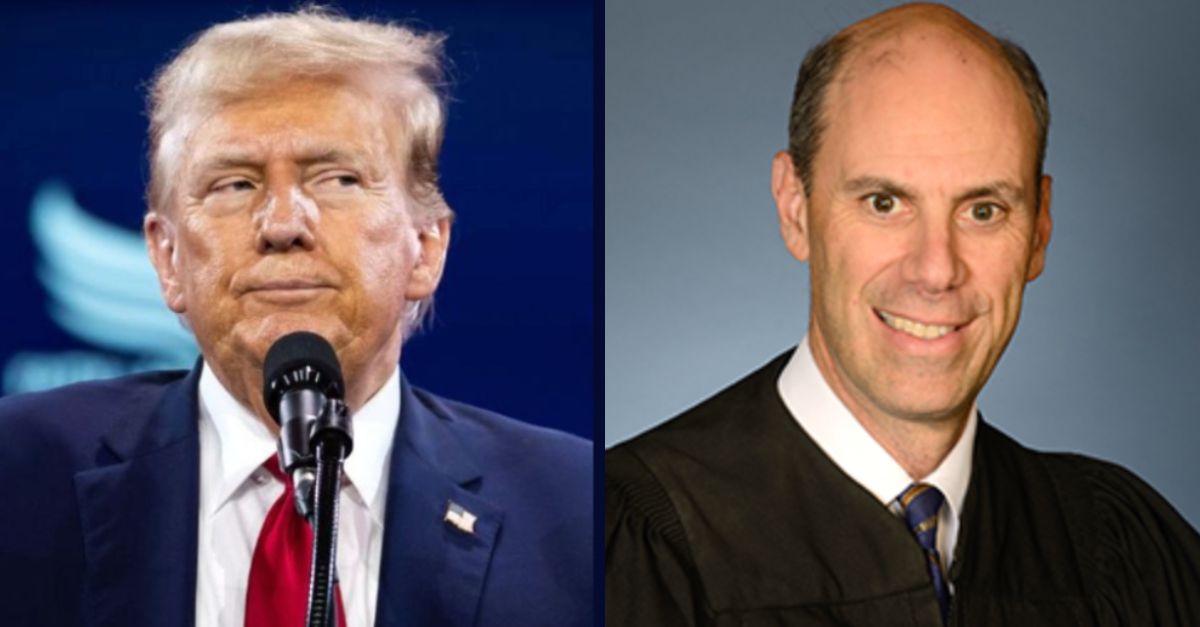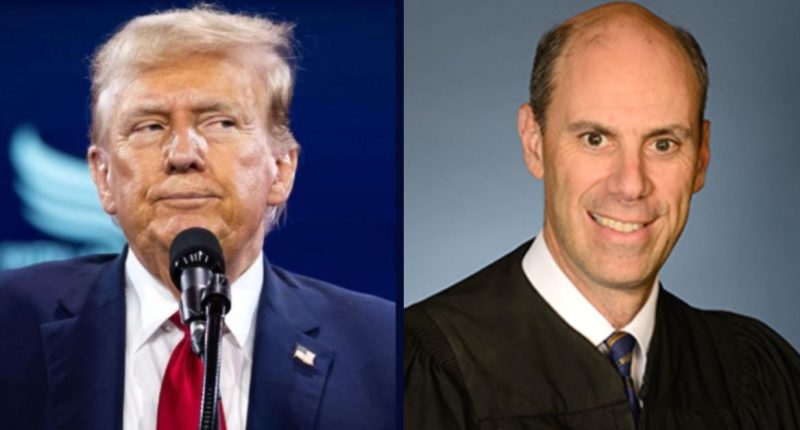
Left: Donald Trump speaks at the annual Road to Majority conference in Washington, DC, in June 2024 (Allison Bailey/NurPhoto via AP). Right: U.S. Chief District Judge James Boasberg (U.S. District Court for the District of Columbia).
A judicial thorn in the Trump administration‘s side is set to grow more pronounced as an ardent critic of the current government will oversee a lawsuit about inadvertently leaked national security information.
On Tuesday afternoon, nonprofit government transparency organization American Oversight filed a Federal Records Act lawsuit in Washington, D.C., against several members of President Donald Trump’s cabinet over the use of the Signal messaging app to discuss and plan a series of military strikes against Yemen.
On Wednesday morning, the case was randomly assigned to U.S. District Chief Judge James E. Boasberg, a jurist who got his start under George W. Bush and was then promoted by Barack Obama.
The judge’s name will be familiar to those in tune with another recent case involving national security issues and state secrets claims.
On March 15, the American Civil Liberties Union (ACLU) sued and won an immediate, though somewhat empty, victory over controversial deportation plans premised on an obscure 18th century wartime authority known as the Alien Enemies Act of 1798.
In that earlier case, Boasberg worked quickly and on a Saturday, issuing a temporary restraining order “to maintain the status quo” that same morning and then issuing a bench ruling for the Trump administration to turn planes around containing Venezuelan immigrants later that same evening. The government openly defied the court, however, and refused to interfere with the aircraft.
Ire followed.
First, the plaintiffs complained.
“If that is how the government proceeded, it was a blatant violation of the Court’s Order,” ACLU attorneys wrote. “Whether or not the planes had cleared U.S. territory, the U.S. retained custody at least until the planes landed and the individuals were turned over to foreign governments. And the Court could not have been clearer that it was concerned with losing jurisdiction and authority to order the individuals returned if they were handed over to foreign governments, not with whether the planes had cleared U.S. territory or had even landed in another country.”
The Trump administration, for its part, moved forward in two-prong fashion: first, by saying it ignored the oral order because it was not repeated in a terse written order issued that same night.
Then, all but simultaneously, Department of Justice attorneys acknowledged the oral order by leapfrogging Boasberg’s authority and pleading with the U.S. Court of Appeals for the District of Columbia Circuit to have the judge removed over his directive to bring back the detainees who were en route to a notorious prison in El Salvador — arguing the judge acted outside the scope of his authority.
Two days later, the judge had his turn to express outrage.
“I memorialize it in shorthand, but you’re telling me that that very clear point, you’re saying that you felt you could disregard it?” Boasberg pressed Deputy Associate Attorney General Abhishek Kambli. “Because it wasn’t in the written order?”
The government lawyer, for his part, repeatedly offered an iteration of an answer that suggested he was not authorized to relay any information to the court due to “national security concerns.”
A cascade of recriminations ensued.
Trump himself took to social media to call for Boasberg to be impeached and removed from his lifetime perch — while describing the long-serving judge as a “troublemaker and agitator”; Chief Justice John Roberts then issued a rare rebuke and rubbished the 45th and 47th president’s suggestion. Online, the president’s allies continued to criticize the district court judge. In a motion for a stay of the temporary restraining order, the DOJ chastised Boasberg’s questioning of Kambli as “purposeless and frustrating.”
The judge did not let up or waiver.
On March 20, the judge issued a scathing order that termed the DOJ’s explanations for the government’s conduct “woefully insufficient.” The next day, during a hearing, Boasberg repeatedly castigated Deputy Assistant Attorney General Drew Ensign for the “intemperate and disrespectful” tone of the government’s court filings, accused the administration of likely breaking the law, and promised those responsible would suffer “consequences” for violating the oral order.
On March 24, the judge declined to stay his restraining order and found the deportations that occurred in violation of that order “unlawful.” Boasberg also mused that “torture likely awaits” the men sent to El Salvador and said each of them were “entitled to individualized hearings to determine whether the [Alien Enemies] Act applies to them at all.”
That same day, two somewhat related things happened.
In a court filing, the Trump administration invoked the state secrets privilege to avoid any further questions or request for information from Boasberg about the deportation flights — arguing the judge’s inquiries had “no bearing on any relevant legal issue.”
“The information sought by the Court is subject to the state secrets privilege because disclosure would pose reasonable danger to national security and foreign affairs,” the DOJ wrote.
Also that morning, the editor-in-chief of The Atlantic, Jeffrey Goldberg, reported that he was accidentally added to the Yemen group chat by national security adviser Michael Waltz. Since the scandal broke out over that lapse in operational security, calls have erupted for resignations or axes to fall.
Love true crime? Sign up for our newsletter, The Law&Crime Docket, to get the latest real-life crime stories delivered right to your inbox.
To hear critics tell it, the Trump administration divulged numerous state secrets in a group chat with a nationally-renowned reporter.
The state secrets doctrine is not, however, part of the lawsuit filed by American Oversight that names Defense Secretary Pete Hegseth as the leading defendant. At least not yet.
But the judge in charge of the Signal records-keeping case is a critic of the Trump administration who has been told that highly-publicized deportation flights are state secrets. Meanwhile, the Trump administration has told journalists and members of Congress the Signal group chat about military plans did not divulge classified national security information.
Despite the apparent overlapping issues around state secrets and national security concerns, Boasberg, of course, will be formally hamstrung from extrapolating one case into the other.







